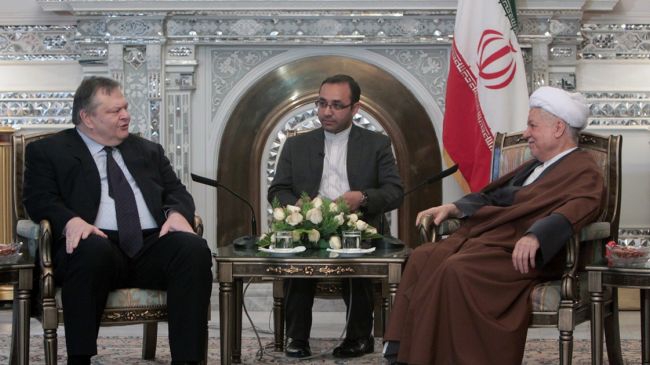 A high-ranking Iranian official terms the assumption of the European Union rotating presidency as a historic opportunity for Greece, stating that the EU must not be influenced neither by the United States nor Israel when it comes to world issues.
A high-ranking Iranian official terms the assumption of the European Union rotating presidency as a historic opportunity for Greece, stating that the EU must not be influenced neither by the United States nor Israel when it comes to world issues. During a meeting with visiting Greek Foreign Minister Evangelos Venizelos in Tehran on Sunday, Chairman of Irans Expediency Council Ayatollah Akbar Hashemi Rafsanjani described Tehran-Athens relations after the victory of Irans 1979 Islamic Revolution as quite good, calling on Greece and other EU member states to exercise vigilance and not repeat previous mistakes under the influence of others.
Greece took over the rotating presidency of the European Union on January 8. It is the fifth time that Greece assumes the EU rotating presidency since its accession in 1981.
Rafsanjani further noted that chilly relations between Iran and the West would not be in favor of either side.
As the worlds leading energy supplier, our region (the Middle East) must be calm, and Iran -- considering its geographical, historical and political status -- is the axis of security in the region, he pointed out.
Venizelos, for his part, pointed to cultural affinities between the Greek and Iranian nations, noting that enhancement of economic and trade ties with Eastern countries is a priority for the Greek government.
He also described Iran as an influential country in the region and the entire world, stressing that Athens wants to broaden relations with Tehran on the basis of mutual interest.
The Greek foreign minister also called the landmark deal clinched between Iran and the five permanent members of the United Nations Security Council -- Russia, China, France, Britain, and the US -- plus Germany over Tehrans peaceful nuclear program a step towards establishment of international security.
On January 12, Iran and the six countries finalized an agreement on ways to implement the interim nuclear deal that the two sides struck in Geneva on November 24, 2013. The accord, which went into effect on January 20, is aimed at setting the stage for the full resolution of the decade-old standoff over Irans nuclear energy program.
By Press TV
The Iran Project is not responsible for the content of quoted articles.











